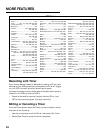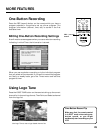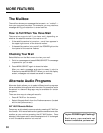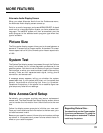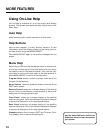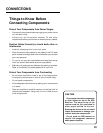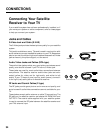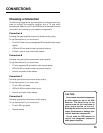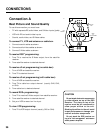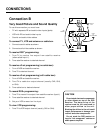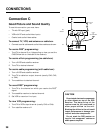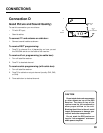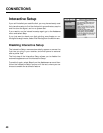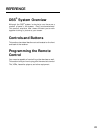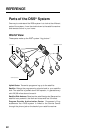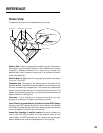
CONNECTIONS
36
Connection A
Best Picture and Sound Quality
To use this connection you must have:
• TV with separate RF, audio/video, and S-Video inputs (jacks)
• VCR with RF and audio/video inputs
• Coaxial, audio/video, and S-Video cables
To connect TV, VCR and antenna or cable box.
1. Connect coaxial cables as shown.
2. Connect audio/video cables as shown.
3. Connect S-Video cable as shown.
To receive DSS
®
programming:
1. Tune TV to receive the S-Video output from the satellite
receiver.
2. Tune satellite receiver to desired channel.
To receive off-air programming (no cable box):
1. Turn off VCR and satellite receiver.
2. Tune TV to desired channel.
To receive off-air programming (with cable box):
1. Turn off VCR and satellite receiver.
2. Tune TV to cable box output channel (usually CH2, CH3,
or CH4).
3. Tune cable box to desired channel.
To record DSS
®
programming:
1. Tune TV to receive S-Video output from satellite receiver.
2. Tune satellite receiver to desired channel.
3. Set your VCR to record on line input.
To view VCR programming:
1. Tune TV to VCR output channel (usually CH3 or CH4).
VIDEO
DSS
RECEIVER
VCR
IN FROM ANT
OUT TO TV
L
R
S-VIDEO
S-VIDEO
VIDEO
AUDIO
LR
SATELLITE IN
AUDIO
L
IN
R
LR
VIDEO
AUDIO
AUDIO INVIDEO IN
SATELLITE
DISH
CH3
CH4
TV
OUT TO TV
IN FROM ANT
CABLE
OR
OFF-AIR ANTENNA
CH4
CH3
AUDIO OUTVIDEO OUT
CAUTION
Do not stack electronic components
or other objects on top of the DSS
Receiver. The slots on top of the
receiver must be left uncovered to
allow proper airflow to the unit.
Blocking the airflow to the unit could
impair performance or damage your
receiver and other components.
Do not stack the DSS receiver on
top of a “hot component” such as an
audio power amplifier.



